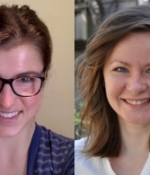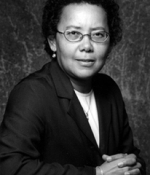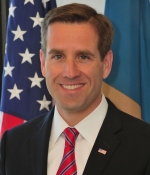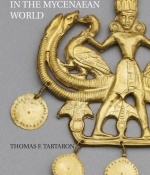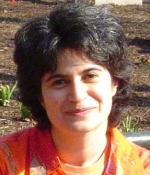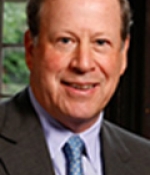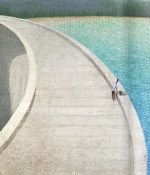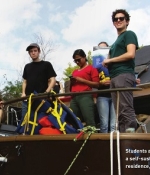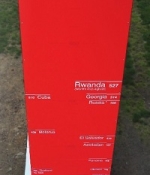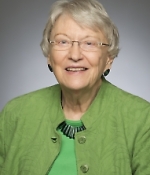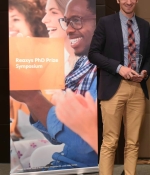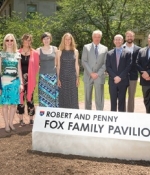2016
Seven From College Win Thouron Awards
Four Penn Arts and Sciences seniors and three alumni have received Thouron Awards to pursue graduate studies in the United Kingdom. The scholarship recipients are:
Senior and Alumna Awarded 2016 Gates Cambridge Scholarships
A senior and an alumna of the College of Arts and Sciences at Penn have both won 2016 Gates Cambridge Scholarships to pursue graduate degrees at the University of Cambridge in the United Kingdom. Lucia Calthorpe, C'16, and Morgan Seag, C'08, are among 35 United States citizens selected and are the 29th and 30th Penn recipients since the scholarships were established in 2001.
Barbara Savage Featured in Two Oxford University Lectures
Barbara Savage, a historian and the Geraldine R. Segal Professor of American Social Thought and Head of the Department of Africana Studies, was recently featured twice as a guest lecturer at Oxford University. Her lectures, "Professor Merze Tate: Diplomatic Historian, Cosmopolitan Woman" and "Creating a New Field: Black Women's Intellectual History," were followed by short responses from scholars from a variety of perspectives.
Scholarship Honoring Beau Biden Will Benefit Students at Penn
The University of Pennsylvania and the Tau Chapter of Psi Upsilon have announced the creation of the Joseph R. “Beau” Biden III Memorial Scholarship to provide financial support to an undergraduate in the College of Arts and Sciences who would otherwise be unable to meet the cost of a Penn education.
PIK Professors Call Attention to the Use of Race in Human Genetic Research
Dorothy Roberts and Sarah Tishkoff have coauthored a perspective piece published this week in the journal Science that calls for an end to the use of genetic concepts of race in biological research.
Aviv Nevo Appointed Penn Integrates Knowledge Professor
Aviv Nevo has been named the University of Pennsylvania’s 17th Penn Integrates Knowledge Professor, effective July 1, 2016. The announcement was made today by Penn President Amy Gutmann and Provost Vincent Price.
Students Test Their Powers of Persuasion on Gun Control
It’s not easy to change people’s minds on political issues. That’s one of the lessons Diana Mutz, Samuel A. Stouffer Professor of Political Science and Communication, wanted to impart to the undergraduates in her Media and Politics class. It’s even harder still when your tool for persuasion is a 30-second video.
Professor Receives Early Career Award
Lauren Sallan, assistant professor of earth and environmental science, has received the Stensiö Award, which is given to an early career researcher in early vertebrate palaeontology. Named after Swedish paleozoologist Erik Stensiö, the award recognizes the research and impact of a scholar within 10 years of receiving a Ph.D.
Penn Arts and Sciences Offers New Major in Nutrition Science, Minor in Survey Research and Analytics
Beginning this semester, Penn Arts and Sciences is offering a new cross-school major in nutrition science and a new minor in survey research and data analytics.
Tartaron Wins Archaeological Book of the Year Award
Thomas Tartaron, associate professor of classical studies, has won the Archaeological Institute of America’s James R. Wiseman Book Award for best archaeological book of the year, for Maritime Networks in the Mycenaean World. The book takes a new look at maritime life among the Mycenaean Greeks from 1600 to 1100 B.C.
Deborah Thomas Named Editor-in-Chief of “American Anthropologist”
Deborah Thomas, an anthropology professor in Penn Arts and Sciences, has been named editor-in-chief of the American Anthropological Association’s flagship journal American Anthropologist, effective July 1. The position runs through June 30, 2020.
Robert Ghrist Brings Complicated Math to the Masses
Robert Ghrist, a Penn Integrates Knowledge (PIK) Professor with appointments in Penn Arts and Sciences and the School of Engineering and Applied Science, is working to make confusing mathematics topics understandable and interesting to non-mathematicians. The Andrea Mitchell University Professor, Ghrist studies a branch of math called algebraic topology, which revolves around understanding spaces and holes between items.
Researchers Show That Cubic Membranes Might Defend Sick Cells
It’s well known that, when cells are subject to stress, starvation, or viral infection, they sometimes adopt a cubic architecture. Unlike the simple spherical structure of membranes in healthy cells, these cubic membranes, or cubosomes, are very complex, forming an interconnected network of water channels resembling a “plumber’s nightmare.”Yet scientists still don’t have a clear understanding of how or why this happens.
2015
College of Arts & Sciences Annual Undergraduate Research Fair – October 24, 2015
Loraine Terrell, Alex Schein & Susan Ahlborn
Verkholantsev Wins Book Prize
Julia Verkholantsev, an associate professor of Slavic languages and literatures, has received the Early Slavic Studies Association Book Prize for The Slavic Letters of St. Jerome: The History of the Legend and Its Legacy, or, How the Translator of the Vulgate Became an Apostle of the Slavs.
AIDS Treatment Also Benefits Health, Economics of People Without HIV, Penn Study Shows
In rural Malawi, roughly 10 percent of the adult population has HIV. At the peak of the epidemic, in the 1990s and early 2000s, nearly everyone knew someone infected with or affected by the virus—what Hans-Peter Kohler, Frederick J. Warren Professor of Demography in Penn Arts and Sciences, describes as a generalized epidemic. Life expectancy dropped dramatically.
Researchers Find Antarctic Ice Sheet Has Been Frozen for 14 Million Years
In a new study in Scientific Reports, Penn researchers use an innovative technique to date one of Antarctica’s ancient lake deposits. They found that the deposits have remained frozen for at least the last 14 million years, suggesting that the surrounding region, the East Antarctic Ice Sheet (EAIS) has likewise remained intact.
Remembering Penn Arts and Sciences Overseers’ Chair David Silfen
David M. Silfen, C’66, chairman of Penn Arts and Sciences’ Board of Overseers and vice-chair of the University of Pennsylvania Board of Trustees, died on November 28.
Arts and Sciences Student a Finalist for National Physics Award
Xingting Gong, a 2015 graduate of the College of Arts and Sciences, was a finalist for this year’s LeRoy Apker Award, given by the American Physical Society to recognize outstanding achievements in physics by undergraduate students, and thereby provide encouragement to young physicists who have demonstrated great potential for future scientific accomplishment.
Linguists Document Philadelphia ‘Accent’ of American Sign Language
Meredith Tamminga, an assistant professor in linguistics and director of the University’s Language Variation and Cognition Lab, and Jami Fisher, a linguistics lecturer and Penn’s ASL Program coordinator, are working to document what they’re calling the Philadelphia "accent" of American Sign Language (ASL).“Philadelphia ASL historically, and I think anecdotally, has always been seen as a little different,” Fisher says. “We’re not really sure why.”
OMNIA: The Compass of the Mind
By Abigail MeiselBefore you set out for your next hike, make sure you bring sturdy boots, ample water, and an understanding of the cognitive underpinnings of your sense of direction.
OMNIA: Story of Sustainability
The Penn Program in the Environmental Humanities bridges disciplines.
OMNIA: Rare Earth Separations Made Simple
By Rebecca GuenardThe Claw! Descending into a congregate of plush toys, the claw pulls out a single prize and isolates it from the pack. We are all familiar with the popular arcade game; now imagine such a mechanism put to use at the atomic level. Eric Schelter, associate professor of chemistry, has discovered a molecular claw can be handy for separating rare earth metals.
OMNIA: No Man's Land
The Continued Long-Term Consequences of Mass Incarceration in the United States
Biologists Characterize New Form of mRNA Regulation
In a new report in the journal The Plant Cell, a team of biologists led by Assistant Professor Brian Gregory and graduate student Lee E. Vandivier used material from both humans and plants to examine chemical modifications to messenger RNA, or mRNA. They found that the modifications appear to play a significant role in the process by which mRNAs either survive and become translated into protein or are targeted for degradation.
Senior Adebisi Ogunrinde Wins International Rhodes Scholarship
Adebisi (Debi) Ogunrinde, a senior from Halifax, Nova Scotia, has won a prestigious Rhodes Scholarship. She is one of only 11 recipients from Canada. Ogunrinde will pursue a master’s in social anthropology and a master’s in public policy at the University of Oxford in England. Ogunrinde will graduate in May 2016 with a dual bachelor’s degree in international studies from Penn Arts and Sciences and in economics from the Wharton School.
Senior Jennifer Hebert Wins Rhodes Scholarship
Jennifer Hebert from Pittsburgh, Pa., has won the prestigious Rhodes Scholarship. She plans to pursue a master’s degree in psychiatry at the University of Oxford in England.
Chemists Find Biological Molecules That Can Switch "Handedness"
A new study led by Virgil Percec, the P. Roy Vagelos Professor of Chemistry, has led to the discovery of a class of molecules that can produce a double helix more consistent and more highly ordered than that of DNA, despite being made of a random mix of left- and right-"handed" building blocks. Before now scientists had thought such structures could only be made of entirely left- or right-handed molecules.
Sociologists Examine the Needs of South Philly’s Latino Immigrants
To study how immigrants incorporate into new communities, Penn researchers had to develop a unique survey strategy. “Immigrants are difficult to reach because they might be undocumented; they have often recently arrived,” says Professor of Sociology Emilio Parrado. “They work all the time. They’re highly mobile. And so they are generally underrepresented in standard surveys. We had to tailor our survey strategy and survey design to be able to reach them.”
Penn Arts and Sciences Professors named Fellows of the American Physical Society
Edmund J. and Louise W. Kahn Term Professor in the Natural Sciences Bhuvnesh Jain and Fay R. and Eugene L. Langberg Professor of Physics Mark Trodden, both in the Department of Physics and Astronomy, have been elected to Fellowship in the American Physical Society. Election to Fellowship is limited to one-half of one percent of the membership of the APS, and is recognition by their peers of their outstanding contributions to physics.
Professor Joullié Receives John Scott Award for Inventions Benefitting Mankind
Madeleine Joullié, a professor of chemistry in Penn Arts and Sciences, will receive the 2015 John Scott Award at a ceremony on November 20, 2015, in Philadelphia. Dating from 1822, the John Scott Award is one of the oldest scientific honors in the U.S. It is given to “the most deserving” men and women whose inventions have contributed in an outstanding way to the “comfort, welfare, and happiness” of mankind.
Chemistry Ph.D. Student Wins International Prize
John Tellis, a doctoral candidate in chemistry, was one of three winners of the 2015 Reaxys Ph.D. Prize, given at an annual symposium held at the Chinese University of Hong Kong. Sponsored by Elsevier, a provider of scientific, technical, and medical information products and services, the Reaxys prize recognizes innovative and original research in chemistry, with an emphasis on synthesis.
Ancient Mass Extinction Led to Dominance of Tiny Fish
According to new research led by Lauren Sallan, an assistant professor of earth and environmental science, a mass extinction 359 million years ago known as the Hangenberg event triggered a drastic and lasting transformation of Earth’s vertebrate community. Beforehand, large creatures were the norm, but for at least 40 million years following the die-off the oceans were dominated by markedly smaller fish.
Schelter Wins Award for Creative Work in Inorganic Chemistry
Associate Professor of Chemistry Eric Schelter has been awarded the 2016 Harry Gray Award for Creative Work in Inorganic Chemistry by a Young Investigator by the American Chemical Society (ACS). The award was created to recognize creative and influential research in a forefront area of inorganic chemistry.
Penn Musicians Battle for Top Spot in Fourth Annual Blutt Band Slam
Kyra Schulman, C'18, performs a cover of "Landslide" by Fleetwood Mac.
Our Debt of Honor: A Q&A With Beth Linker on New Film That Traces the History of Disabled American Veterans
The United States celebrates Veteran’s Day each November, recognizing all those who have served in its armed forces. On November 10, 2015, PBS aired a new Ric Burns documentary, Debt of Honor: Disabled Veterans in American History, featuring Beth Linker, associate professor of history and sociology of science in Penn Arts and Sciences. Linker’s research focuses on the social and cultural history of U.S. medicine in the 19th and 20th centuries.
Penn Physicists Share in Breakthrough Prize in Fundamental Physics
The Sudbury Neutrino Observatory Collaboration, which includes physicists from Penn Arts and Sciences, is sharing the 2016 Breakthrough Prize in Fundamental Physics.
Professor Tulia Falleti and Doctoral Student Emmerich Davies of Political Science Discuss the Morales Revolution in Bolivia
A paper authored by Tulia Falleti, Class of 1965 Endowed Term Professor of Political Science, and Emmerich Davies, doctoral candidate in political science, was cited in a Financial Times article on the Morales revolution in Bolivia. Read the article here.
New Gift from Robert and Penny Fox Aids Fels Expansion
A gift from Robert A. Fox, C’52, and Penny Grossman Fox, Ed’53, has helped launch a new era for the Fels Institute of Government, which is reorganizing and expanding in ways designed to increase Penn’s participation in and effect on public policy at the local, national, and international levels.
Penn Chemists Join International Collaboration to Re-Engineer Disaster Tents
Researchers at the University of Pennsylvania have received a five-year, $3.6 million grant from the National Science Foundation to develop materials for multifunctional coatings on emergency tents, enabling them to manage water, prevent the spread of bacteria, and capture and store solar energy. The grant is part of the NSF’s Partnerships in International Research and Education (PIRE) program, which seeks to foster global collaborations on topics of societal importance.
Adrian Raine Investigates the Intersection of Neuroscience and Crime
In his October 20 Penn Lightbulb Café talk on “The Anatomy of Violence,” Adrian Raine, a Penn Integrates Knowledge Professor with appointments in Penn Arts and Sciences’ Departments of Criminology and Psychology, discussed the neuroscience of crime and its implications for societal views of moral responsibility, free will, and punishment.
Larry Silver Named Phi Beta Kappa Visiting Scholar
Larry A. Silver, James and Nan Wagner Farquhar Professor of History of Art, has been named a Phi Beta Kappa Visiting Scholar for the 2015-2016 academic year. He is one of 13 distinguished scholars selected by the Phi Beta Kappa Society for this program.
Tukufu Zuberi Expands the Role of the Public Intellectual
Whether he’s in a college classroom, on the set of a TV or film production, or meeting with an African head of state, Tukufu Zuberi, Lasry Family Professor of Race Relations, professor of sociology, and professor of Africana studies, is always teaching.
Michael Horowitz Explores "Why Leaders Fight"
In his new book Why Leaders Fight, Michael Horowitz, an associate professor of political science, proposes a theory about how a leader’s decisions about war, peace, and risk propensity are influenced by individual background.
$1 Million Gift Provides Scholarships to Penn Students from Northeastern Pennsylvania
A $1 million endowment gift from Carol A. Kiryluk of Key Biscayne, Florida, will establish a new scholarship fund for students from northeastern Pennsylvania to attend the University of Pennsylvania.
Professors Receive Grants to Study Biological Applications of New 2-D Materials
Graphene, a one-atom-thick lattice of carbon atoms, has been the focus of intense research since its discovery more than a decade ago. Effectively two-dimensional, graphene has unique physical properties and ultra-high conductivity and promises to revolutionize electronic devices as the ability to mass produce it grows.However, graphene is only one member of a large family of two-dimensional materials, each with its own unique and useful properties.

